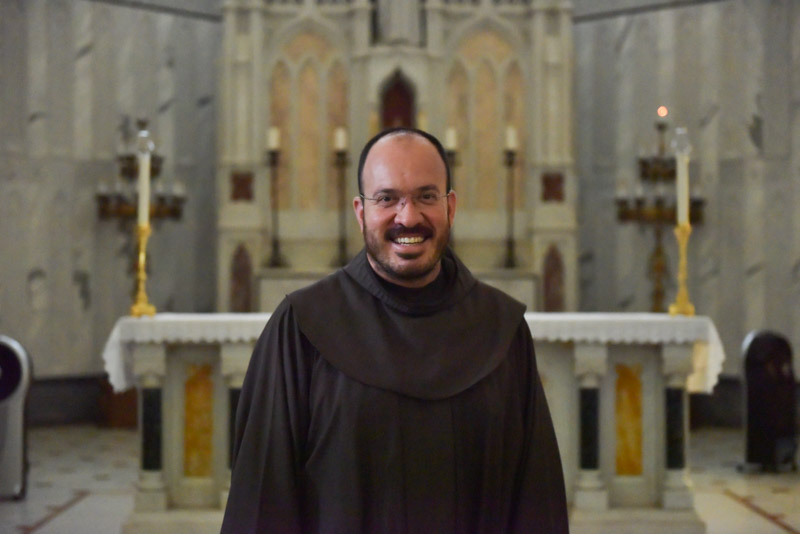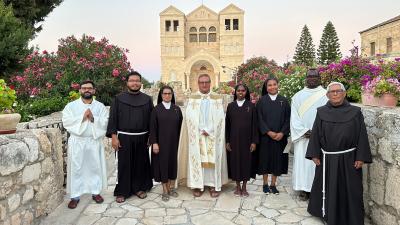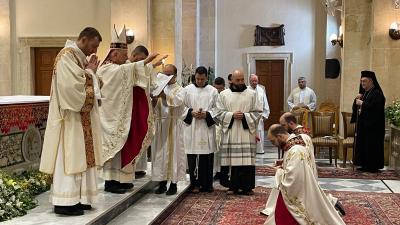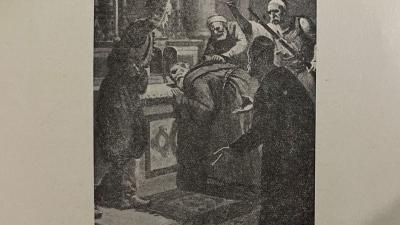
800 years have gone by since the friars arrived in the Middle East, and many things have changed since the beginning of this adventure. However, the commitment and dedication with which, for 800 years, the friars have guarded the holy places and have worked to serve the local people have not changed. For this reason, in order to understand what the Custody of the Holy Land is today, we must begin with them and their stories: they come from all over the world and from different countries and each of them has a specific mission.
Br. Agustín Pelayo Fregoso is from Mexico, but has been serving the Custody of the Holy Land for years. He began his vocational journey in Buenos Aires and met the man who would become Pope Francis, when he was still a cardinal. He has toured several countries and speaks six languages. Today, he is based out of Jaffa, and serves as the superior of the church of St. Anthony.
How did you get to know the Custody of the Holy Land?
I was taking a course to obtain a tourist license. I was in a home for young people studying at the university, who wanted to be in a faith-filled environment. In the three years I was there, the boys often went to the Holy Land and they went on pilgrimages. They were always enthusiastic, and every time they came back from the Holy Land I wondered why they went. So, as I continued to study, I began to discern my vocation and I attended a diocesan seminary. I was a master of ceremonies in the cathedral and so, surprisingly, someone wrote to the Holy Land without my knowing about it. They told me: “If you wish, since you are studying tourism, you can do it in the Holy Land and put yourself at the service of the Church.” I had never thought about that before, but now someone was asking me to have this experience so as to understand my path. Later, I got in touch with Br. Ricardo from Mount Tabor, and he came to Mexico. He wore a habit and for me it was a shock, because it was forbidden for us to wear one. If you wore the habit, you had to pay a fine after the revolution.
After that, I finished my license in the seminary and then I decided to enter the friars of the Custody of the Holy Land.
What was your journey like?
I went to Buenos Aires and then to Rome. I took the habit and came to the Holy Land for the novitiate in Ein Karem: it was the third country in the course of three years for me.
From there, I went to Bethlehem. It was not easy with the second intifada, but it was an experience that had a profound effect on me. Then, I moved to Jerusalem: four years, four communities, four countries, four languages, because I had begun to study Arabic a little. I then did a year of language study in Egypt. I had a very nice experience with the monastic friars who are Coptic, which is a different rite, and who are located near the pyramids.
After that, I came back to Jerusalem and to St. Savior’s to study theology for four years.
Before being ordained, the Custos thought about sending me to study law, but the night before my ordination, everything changed and he sent me to be the vice master of postulants in Montefalco. I worked in the parish with the people of the countryside and I continued to study Franciscan spirituality. I got my degree last year. Then I went to Betfage, and I worked for the Christian Information Center and for the Franciscan Foundation for the Holy Land before coming here.
What is your mission in the Holy Land today?
I think the Franciscan charism is not just one thing. There is brotherhood, there is simplicity and there is also the freedom of your choice to be open and available to go where they ask you to go. The Church does not work like a company. So, I arrived here in Jaffa in September 2016, as the superior of the house and parochial vicar. Now I'm studying my sixth language (I speak Spanish, Italian, Portuguese, English, Arabic and Hebrew). We are four friars here and we mainly serve migrants. In Jaffa, greatest number of migrants are Indian.
There are several communities: we celebrate mass for Arabs, Indians, Filipinos, Africans and the English. On the other hand, in the other church, at St. Peter’s, we celebrate for the Latin Americans who then come with the Italians from the embassy. And then for Hebrew speakers (there are Arabs who no longer understand Arabic or do not prefer it and would rather go to mass there). When I do not celebrate mass, I am the superior: I count the coins, and I prepare the weekend activities with the people.
Now I have this opportunity to understand another way of life and I can say that I am very happy.
In the Hebrew course that I attend, they always ask me to speak about the friars, about the faith, about who Jesus is. In the end, we have the same roots because the Old Testament is the same.
What motivates you on your mission and your spiritual life?
The thing that motivates me here with the people is to see the simplicity with which they live. I always tell them that I understand them, because I had the same experience of being afraid of being arrested for being undocumented. I had the experience when I was 18 years and I went to America; I had a visa to enter the country but I did not have permission to work. Yet I was forced to work to pay for my university studies. It is very powerful for me to see the sacrifices that these people make and I understand their hardships.
It is really nice to meet them on Saturdays, because they are full of good and very bad experiences and they just need someone to listen to them, who can understand them and encourage them.
We also work hard to put our differences aside because we are the same community; we are Christians; we are Catholics; we are Latin. The problem is that there is not much communication between the communities.
The Church is the only place where migrants feel like they can be themselves. They spend their week working with the fear of being arrested and then they arrive at the church and they are really free: they feel in communion and at home.
Do you have a message for a young person who is discerning?
I think everyone is looking for their own happiness, but if you hear the call, you will have a good experience and you have to be open. It is not because you can do something well and you want it that you will do it. I still remember the words of a friar who told me: there will always be a bit of light in order to move forward and there will always be a bit of darkness to doubt, so it is better to experience the light.
N.S. - B.G.




